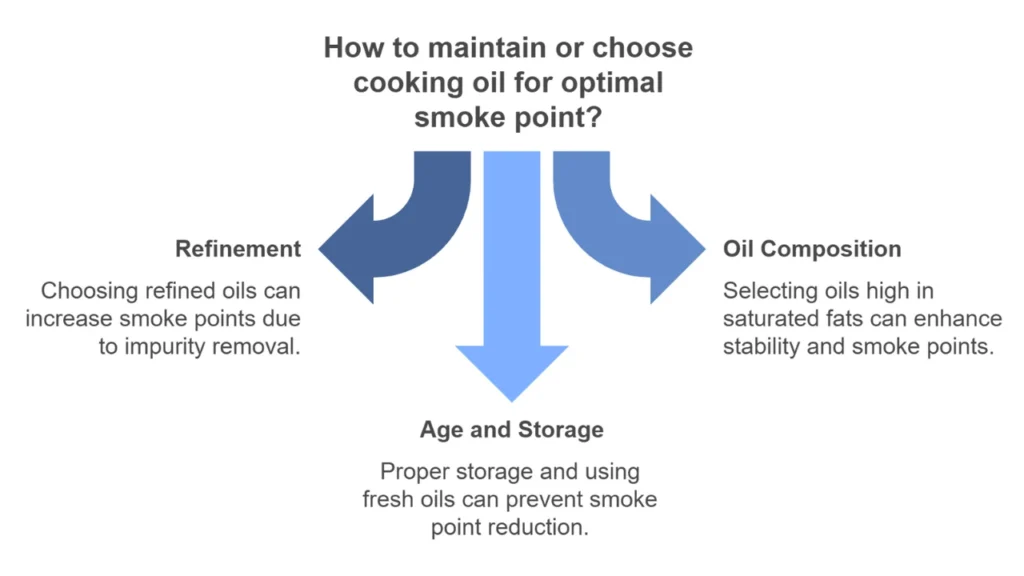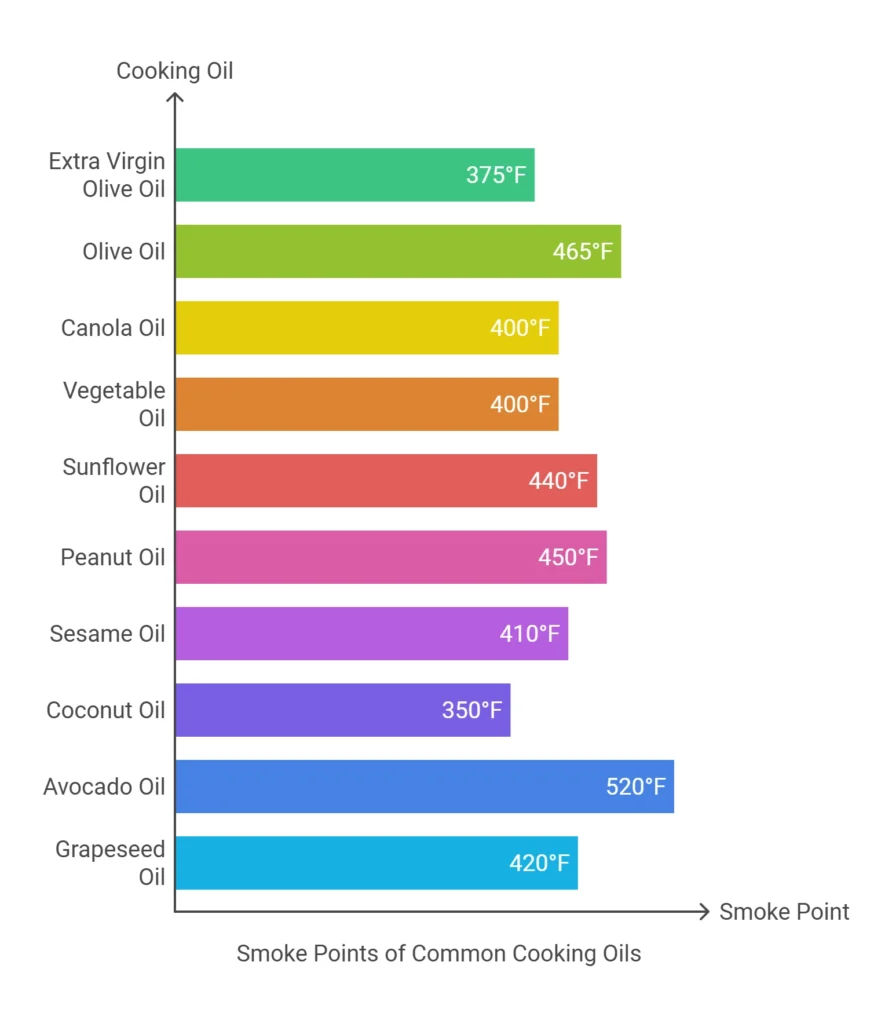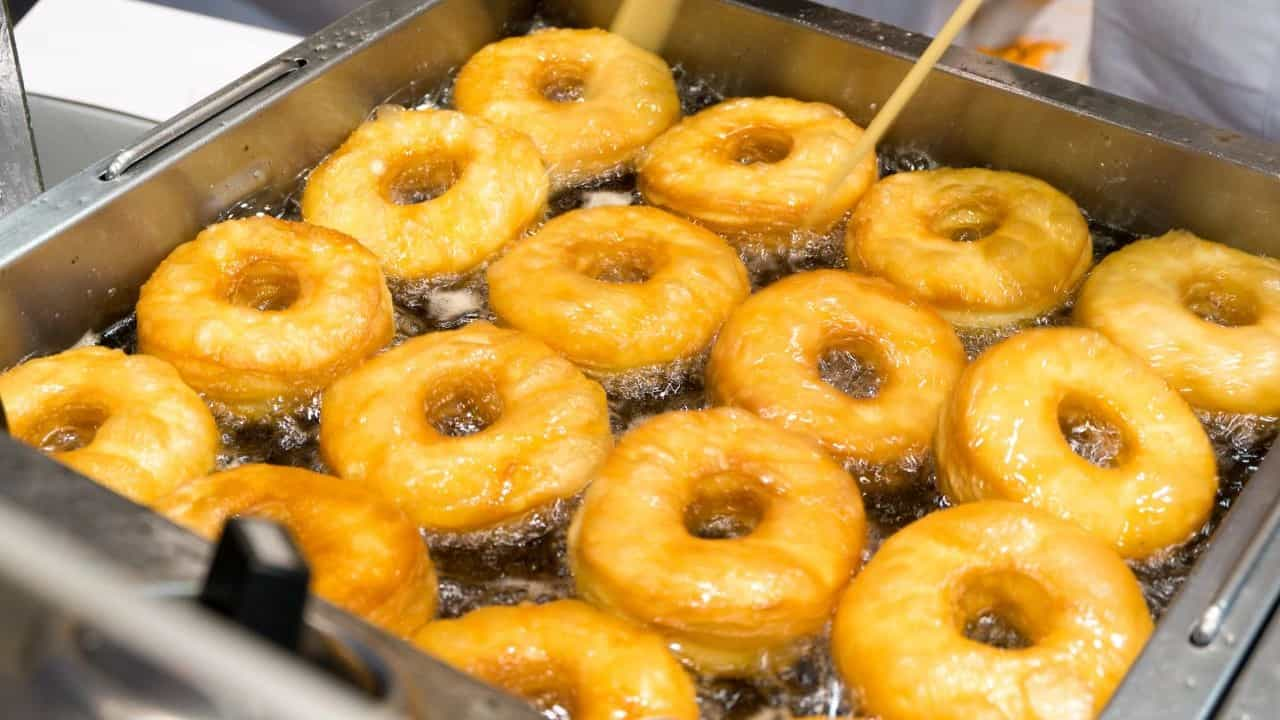Ever had trouble achieving that perfect golden-brown crust on your doughnuts? The secret is in picking the right frying oil. The oil you use for frying doughnuts is crucial to their taste and texture. This guide will help you select the ideal doughnut frying oil. Are you ready to improve your doughnut-making skills?
What Is Doughnut Frying Oil?
Now that we’ve covered the basics, let’s explore the core of donut-making: the frying oil. Doughnut frying oil is the essential liquid that transforms your dough into those crispy, golden treats we all love.
It’s not just any ordinary cooking fat, though. This special oil needs to withstand high heat without breaking down, usually around 350-365℉. That’s hot enough to cook your donuts perfectly, giving them that crisp outside and fluffy inside.
You might be thinking, “Can’t I just use any oil from my kitchen?” Well, not quite. The right frying oil can significantly impact your donuts. It affects their taste, texture, and even how greasy they feel.
Some oils add flavor, while others are neutral. Some are cheap, others pricey. The key is finding that sweet spot between cost and quality. Remember, when your donuts hit that oil, they should sizzle and dance, not just sit there soaking up grease.
That’s the magic of good frying oil!
Key Factors to Consider When Choosing Doughnut Frying Oil

Choosing the appropriate oil for your doughnuts can significantly impact the quality of your treats. You’ll want to consider a few key factors before you start frying.
Flavor
Flavor is crucial to your doughnuts’ taste. You want an oil that won’t overwhelm your treats. Neutral oils like canola or vegetable oil are excellent choices. They allow the doughnut’s flavor to stand out.
However, some oils can add a pleasant touch. Coconut oil imparts a hint of tropical taste. Peanut oil introduces a subtle nutty note. It’s all about balance. You don’t want the oil to overshadow your doughnuts.
Your oil selection influences more than just taste. It affects the overall eating experience. Some oils leave a greasy feel in the mouth. Others make the doughnut too heavy. The right oil enhances your doughnut without dominating.
Next, let’s discuss another important factor: smoke point.
Smoke Point
Smoke point is crucial when you’re frying doughnuts. It’s the temp where oil starts to break down and smoke. You need an oil with a high smoke point for crispy, golden doughnuts. Oils like canola and peanut excel here, with smoke points around 450℉.
They’ll keep your kitchen smoke-free and your doughnuts tasty.
I’ve learned this the hard way. Once, I used olive oil to fry doughnuts. Big mistake! The kitchen filled with smoke, and the doughnuts tasted off. Use oils designed for high-heat cooking, and you’ll be golden – just like your doughnuts.

Cost
Money matters when selecting your donut frying oil. You want delicious treats without overspending. Canola, vegetable, and sunflower oils are cost-effective. They’re budget-friendly options that still produce excellent donuts.
Liquid shortening is another economical choice. Many donut shops rely on it.
Coconut oil is pricier than other oils. However, some believe its flavor justifies the additional expense. You’ll need to consider the advantages and disadvantages for your business.
Think about your oil consumption and replacement frequency. Your decision can influence your profits. Now, let’s examine how oil impacts your donuts’ flavor.
Oil Absorption
Oil absorption significantly influences your donut’s taste and texture. You want to choose an oil that won’t soak into your donuts excessively. Some oils leave donuts greasy, while others keep them light and fluffy.
The key is to find an oil that fries well but doesn’t overpower your donut’s flavor. Palm oil, for example, stays solid at room temp. This helps prevent excess oil from leaking out of your donuts after frying.
To achieve the best results, fry only 2-4 donuts at once. This maintains the oil temp steady and prevents greasy donuts. After frying, let your donuts drain on paper towels. This step is crucial to removing extra oil and keeping your treats from feeling heavy.
Now, let’s examine some popular types of oils you can use for frying donuts.
Popular Types of Doughnut Frying Oils

Let’s look at doughnut frying oils. You’ve got options, and each one brings something special to the table.
Canola Oil
Canola oil is a top pick for frying doughnuts. You’ll love its light taste that won’t overpower your treats. It’s got a high smoke point of about 400°F, perfect for deep frying. This means your oil won’t burn and leave a bad flavor on your doughnuts.
Canola oil is easy on your wallet too. It heats up fast and maintains the right temp, so you’ll use less energy. Plus, it’s a healthy choice with low saturated fat. Your customers will appreciate that.
From my experience, canola oil gives doughnuts a golden, crispy outside and a soft, fluffy inside. It’s a great option for taste and health.
Coconut Oil
Coconut oil adds a tropical flair to your doughnuts. It has a smoke point of 350°F, ideal for deep-frying. Your treats will emerge with the darkest color among oils. They’ll have a subtle coconut flavor too.
This oil is clear, so it won’t alter your doughnuts’ appearance.
You might pay more for coconut oil than other choices. But many consider it worthwhile. The distinct taste can make your doughnuts stand out. Just remember that some people might detect the coconut undertone.
If you prefer a neutral flavor, you may want to explore another oil.
Liquid Shortening
Moving from coconut oil, let’s discuss liquid shortening. This oil is a favorite for many donut shops. It’s a blend of oils that remains liquid at room temp. You’ll find it simple to use in your kitchen.
Liquid shortening has a high smoke point of 450°F. This allows you to fry your donuts at hot temps without concern. It creates donuts with a light, crisp outside and fluffy inside.
Plus, it won’t add any odd flavors to your treats. The pale yellow color won’t affect your donuts’ appearance either. Best of all, it’s cost-effective for your business. I’ve used it in my shop and customers enjoy the results.
Peanut Oil
Peanut oil packs a punch for your doughnuts. It’s got a high smoke point of about 450°F, making it perfect for deep frying. You’ll love the faint nutty flavor it adds to your treats.
It’s especially great if you’re making nut-topped doughnuts. The taste blends well, creating a yummy combo.
I’ve used peanut oil in my shop for years. It’s a bit pricier than some options, but worth every penny. Your customers will notice the difference. Just remember, some folks have peanut allergies.
If you use this oil, be sure to inform your guests. Safety first, always!
Conclusion
Selecting the appropriate oil for your doughnuts can significantly impact your treats’ quality. You have several options to consider, including canola, coconut, and peanut oil. Each type offers unique benefits.
Keep in mind that flavor and smoke point are crucial factors. Your selection influences taste, texture, and oil absorption in the doughnuts. Take some time to consider your desired outcome for your fried delights.
By choosing the ideal oil, you’ll create crispy, golden doughnuts that will have people eagerly coming back for more.
Learn more: Best Oil for a Fryer – Discover the Top Choice for Frying
FAQs
What’s the best oil for frying dough-nuts?
Canola oil was determined to be the best option overall for frying donuts, delivering traditional flavor, optimal frying results, and the best texture.
However, the best donut fry-oil depends on what you’re after. For cake donuts, you might want a neutral-tasting oil. But if you’re feeling adventurous, try coconut oil for a tropical twist. Just remember, the oil can make or break your sweet treats!
Can I use butter instead of oil for frying donuts?
Whoa there! Butter’s great for bread and cocoa, but it’s not your go-to for deep-frying. It’ll burn faster than you can say “chocolate glaze.” Stick to cooking oils with high smoke points for your donut-making adventures.
How hot should my oil be when frying donuts?
You’ll want your donut oil hot, but not smokin’. Aim for about 350°F to 375°F. Too cool, and you’ll end up with greasy dough balls. Too hot, and you’ll have charred rings. Get it just right, and you’re in donut heaven!
How long should I proof my dough before frying?
Proofing is key! Give your dough about 30 to 40 minutes to rise. It’s like letting a good joke settle – timing is everything. A well-proofed dough will give you light, airy donuts that’ll make your taste buds dance.
Can I reuse my donut frying oil?
Sure thing! But don’t go overboard. After a few uses, that oil’s seen better days. It’s like a stand mixer – great for multiple batches, but eventually, you gotta clean house. Strain it after each use, and store it in a cool, dark place. Your future donuts will thank you!
Resources
https://en.wikipedia.org/wiki/Rapeseed_oil
https://www.medicalnewstoday.com/articles/282857
https://www.seriouseats.com/cooking-fats-101-whats-a-smoke-point-and-why-does-it-matter
https://www.gygiblog.com/blog/2023/08/31/what-is-the-best-oil-for-frying-donuts/
https://www.tastingtable.com/1506601/best-oil-to-use-when-frying-donuts
https://blog.thermoworks.com/time-make-doughnuts-temperature-matters/








